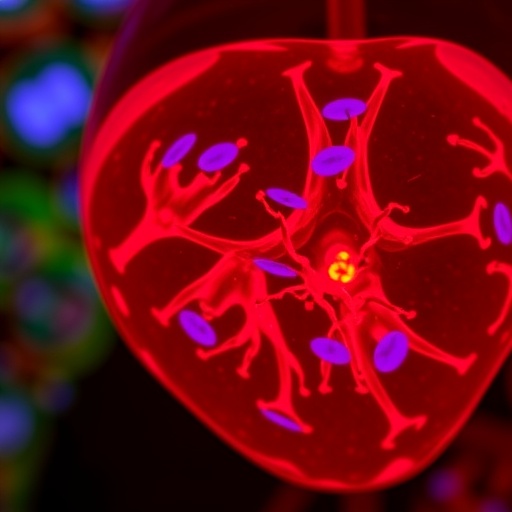Revolutionizing Hepatocellular Carcinoma Treatment: The Role of Tumor Lysine Metabolism in Immune Microenvironment Shaping
Recent advancements in cancer research have unveiled profound insights into the intricate relationship between metabolism and immune response in hepatocellular carcinoma (HCC). In a groundbreaking study led by Lu et al., published in J Transl Med, researchers employed a multi-omics approach to decipher how downregulated tumor lysine metabolism influences the immune microenvironment and subsequent therapeutic responses in HCC. This research stands at the crossroads of metabolic pathways and immunology, highlighting the significance of lysine metabolism as a potential target for enhancing treatment efficacy.
Hepatocellular carcinoma, one of the most prevalent forms of liver cancer, poses significant treatment challenges, primarily due to its late-stage diagnosis and the complexity of its tumor microenvironment. The role of metabolic alterations in cancer progression has become a focal point in understanding tumor biology. This study meticulously examined the metabolic landscape of HCC to uncover the connections between lysine metabolism and immune responses. By integrating various omics technologies, including genomics, proteomics, and metabolomics, the team aimed to provide a comprehensive view of the biochemical changes associated with HCC.
Lysine, an essential amino acid, plays a crucial role in various cellular processes, including protein synthesis, enzyme activity, and cellular signaling. The downregulation of tumor lysine metabolism observed in HCC has far-reaching implications, suggesting that the cancer cells may be adapting their metabolic programs to survive in a challenging microenvironment. This metabolic shift not only supports tumor growth but also interferes with the functionality of immune cells, creating an immunosuppressive landscape conducive to tumor progression.
The research team utilized advanced analytical methods to characterize the metabolic alterations in HCC tissues compared to healthy liver tissues. Through mass spectrometry and RNA sequencing, they identified significant changes in the expression levels of genes involved in lysine metabolism. Their findings indicated a marked reduction in key enzymes responsible for lysine catabolism, which can lead to an accumulation of metabolites that influence immune response pathways. The researchers hypothesize that this metabolic adaptation allows HCC to evade immune surveillance and enhances its resilience against therapeutic interventions.
Moreover, the study highlighted the interplay between tumor lysine metabolism and specific immune cell populations within the tumor microenvironment. The infiltration of immune cells, such as T cells and macrophages, was closely monitored, revealing that altered lysine metabolism correlates with a diminished presence of cytotoxic T cells. This observation suggests that the metabolic state of tumor cells directly affects the recruitment and activity of immune cells, ultimately shaping the efficacy of immunotherapies. Furthermore, the downregulation of lysine metabolism appears to impact the secretion of inflammatory cytokines, further promoting an immunosuppressive milieu.
These findings are particularly relevant given the rising interest in immunotherapies for HCC treatment. Understanding how metabolic dysregulation affects immune responses could pave the way for innovative therapeutic strategies. The integration of lysine metabolism modulation alongside existing immune checkpoint inhibitors holds promise for enhancing treatment responses in HCC patients. This dual approach may not only reverse the immunosuppressive effects of tumor metabolism but also improve the overall survival rates of patients.
Additionally, the research emphasizes the importance of personalized medicine in the treatment of HCC. Identifying patients with distinct metabolic profiles can guide the selection of appropriate therapies, potentially leading to more effective outcomes. The study encourages further investigations into the metabolic pathways involved in HCC and their relationship with immune cell dynamics.
As the field of cancer research continues to evolve, the implications of lysine metabolism extend beyond HCC. This study sets a precedent for exploring the metabolic underpinnings of various cancers and their influence on immune modulation. The potential to manipulate metabolic pathways as a therapeutic adjunct could revolutionize cancer treatment paradigms in the coming years.
In conclusion, Lu et al.’s study provides crucial insights into the metabolic intricacies of hepatocellular carcinoma, shedding light on how downregulated tumor lysine metabolism reshapes the immune microenvironment. By employing a multi-omics profiling strategy, the research underscores the interconnectedness of metabolism and immunity, urging further exploration into metabolic interventions as a means to bolster therapeutic responses. Such advancements not only enhance our understanding of cancer biology but also open new avenues for innovative and effective treatments against one of the most challenging malignancies faced by patients today.
Subject of Research: Metabolism and immune microenvironment in hepatocellular carcinoma.
Article Title: Multi-omics profiling reveals downregulated tumor lysine metabolism reshaping the immune microenvironment and therapeutic responses in hepatocellular carcinoma.
Article References: Lu, X., Qiang, M., Li, R. et al. Multi-omics profiling reveals downregulated tumor lysine metabolism reshaping the immune microenvironment and therapeutic responses in hepatocellular carcinoma. J Transl Med 23, 1117 (2025). https://doi.org/10.1186/s12967-025-07056-3
Image Credits: AI Generated
DOI: 10.1186/s12967-025-07056-3
Keywords: Hepatocellular carcinoma, lysine metabolism, immune microenvironment, cancer research, multi-omics profiling.




